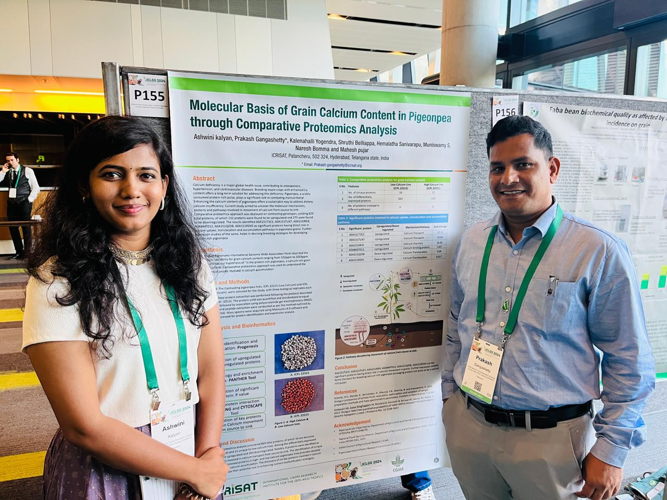Advancements in chickpea, pigeonpea, and groundnut genetics aim to tackle food security and environmental sustainability
Brisbane, Australia – The 11th International Conference on Legume Genetics and Genomics (ICLGG 2024) held from 30 September to 3 October 2024, brought together over 300 global legume researchers to shape the future of legume science.
The ICLGG conference series is dedicated to advancing global strategies for legume improvement that prioritize environmental sustainability. The International Crops Research Institute for the Semi-Arid Tropics (ICRISAT) organized the 6th ICLGG in 2012 and the 10th ICLGG in 2022, and continues to play a pivotal role in this initiative.
At this year’s event, ICRISAT scientists were key contributors, presenting pioneering research such as machine-harvestable, disease-resistant chickpeas, the world’s first pigeonpea hybrids, and high oleic acid peanuts.
“For more than 50 years, ICRISAT has been at the fore of innovative legume science,” asserted Dr Stanford Blade, Deputy Director General-Research, ICRISAT. “As we confront the dual challenge of climate change and a growing global population, our research will play a pivotal role in enhancing global food and nutrition security, while promoting the sustainable management of natural resources.”
Legumes such as chickpea, pigeonpea and groundnut are vital to sustainable agriculture, offering high-protein food sources while reducing greenhouse gas emissions through their unique ability to fix atmospheric nitrogen.
At the high-level conference, ICRISAT’s delegation delivered presentations on recent advances in structural and functional genomics, legume evolution, development, beneficial symbioses, plant defense mechanisms, tolerance to abiotic stress, and plant metabolism. These insights are expected to guide future research and organizational efforts toward legume genetic improvement.
Dr Janila Pasupuleti, Cluster Leader for Crop Breeding at ICRISAT and member of the International Advisory Committee of ICLGG, underscored the importance of innovation in building resilience and mitigating the impacts of a warming planet.
“ICRISAT’s research addresses the critical challenge of developing legume varieties that can thrive in increasingly volatile climates,” shared Dr Pasupuleti, in her virtual presentation, highlighting the co-development of cutting-edge phenotyping tools that enhance selection accuracy and intensity in breeding.

This work aligns with SDGs 2, 13 & 17.






